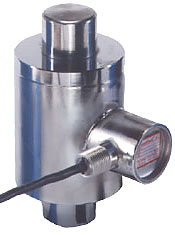This month we continue looking at truck scale service. This months topic is Load Cells. From a service perspective the overall procedure is to examine load cells and the area surrounding them. The load cell area may contain dirt and debris that has built up since the scale’s last check. Load cells must have clearance to deflect through their capacity range. The same debris that can bind the scale deck can also keep the load cells and suspension components from moving freely. Continue reading
Category Archives: Truck Scale Preventive Maintenance and Service
Checking Devices
As we continue to look at service of truck scales, this month we look at checking devices. Some vehicle scales utilize suspension systems that don’t require checking devices, eliminating a time-consuming step in your service protocol. If your scale has checking devices, make sure they are working properly. Inspect check rods to make sure the attachment points are solid. Check for binding.
If there is a problem, weight readings will be inconsistent from section to section. Inspect hardware to ensure jam nuts are tight, rods are level and free of foreign material, and washers are not rusted or distorted. Even if they are working properly, replace corroded hardware components so they don’t fail in the future when you least expect. Continue reading
The foundation of success
This month we continue to look at the overall service and maintenance of a truck scale. Today we look at the weighbridge and the foundation. Even the toughest scale on earth is put at risk on a poor foundation. Cracked foundations can lead to movement or settling which causes chronic calibration errors. Letting little cracks become big cracks may require removing part or all of the scale foundation and pouring a new one for the scale to once again weigh accurately.

It is important that the end user periodically walk around their scale and do a thorough visual check of the foundation and let your service tech know of any issue that you see possibly developing. Take a look at the weighbridge or deck. Rust or crumbling concrete can weaken the scale structure and cause problems. Clean and paint rusted steel decks. Continue reading
Regularly Scheduled Maintenance
We mentioned maintenance a few months ago in this entry. However, we wanted to go a little more in depth with each area in the coming months. Today, we’re going to look at regular calibration service calls. A thorough check-up every six months at the very minimum is the general rule for truck scales. Many companies like Central Carolina Scale offer regularly scheduled maintenance plans for your truck scales.
When deciding how often to have your scale tested, take into consideration your number of weighments, climate and the value of the product being weighed. Aside from the actual calibration, most of the inspection will consist of you or your scale technician conducting a visual inspection of the scale, foundation and surrounding area. Every vehicle scale should be calibrated and tested by a state-licensed servicing agent with no less than 25,000 pounds of certified test weights. A lot of times it is ideal to use a company like Central Carolina Scale in Sanford, North Carolina that has a scale test cart that can test different areas of the scale.
The foundation for success
A proper foundation is one of the most important parts of your truck scale. If the foundation is not constructed properly, built flat and level, or according to the certified foundation drawing, your truck scale foundation could shift and bring the scale out of accepted calibration tolerance.
If the movement continues, your scale will become inoperable and require costly foundation repairs. Many factors must be considered in the process, such as the slope of the site and soil conditions. Below are a few other factors that must be taken into consideration. The SURVIVOR truck scale line quality design and engineering is further complemented by Rice Lake’s ability to Continue reading
Heavy Capacity Preventative Maintenance Schedule
It is probably a good idea to have your heavy capacity truck scales checked at least every six months at a minimum. Also, a convenient time to conduct a preventative maintenance scale inspection is during the regularly scheduled calibration check. It’s a good idea to inspect your truck scale just prior to peak usage times, such as harvest season in agricultural operations. Click here for more detailed scale service info available from Central Carolina Scale.
Programmable Digital Weight Indicator for Truck Scales
HMI Digital Weight Indicators from Rice Lake Weighing Systems, offer a complete line of weight indicators to fit any application. The revolutionary Rice Lake 920i programmable HMI Indicator/Controller takes charge of process applications and provides open connectivity to the most popular networking interfaces. When used in batching / mixing applications, one 920i indicator is capable of handling multiple scales, flow, temperature and pulse. It can control hundreds of I/O set points, queue gates and conveyors, perform yield management functions and store, Continue reading
Truck Scale Digital Weight Indicator Cardinal 225

Truck Scale Indicator
Cardinal’s 225 Navigator features transflective technology which allows the display to be viewed under any lighting conditions from direct sunlight to total darkness. One-inch-high (25 mm) weight characters make viewing easy. View up to 3 scales with total weight simultaneously with the optional dual scale input board; no special software is needed with Cardinal 225 Navigator digital weight indicator.
Entering, viewing, and storing truck names is easy with the 225 Navigator’s convenient Truck ID menu. Complete alphanumeric descriptions for truck and material prompts make storing and recalling tare weight values quick and simple.
Cardinal Truck Scale Load Cell
 The heavy capacity series of compression load cells are ideal for multiple load cell compression applications such as motor truck scales, railroad track scales and heavy duty tank weighing systems. These compression load cells are available in 50K-SCA 22680kg, 100K-SCA 45360 kg and 120K-SCA 54430 kg.
The heavy capacity series of compression load cells are ideal for multiple load cell compression applications such as motor truck scales, railroad track scales and heavy duty tank weighing systems. These compression load cells are available in 50K-SCA 22680kg, 100K-SCA 45360 kg and 120K-SCA 54430 kg.
Cardinal SCA Truck Scale Load cells are fabricated from stainless steel to provide the ultimate in protection when caustic, corrosive or wet environments are encountered. Load cells are hermetically sealed for absolute water protection (IP68). Each load cell is furnished with stainless steel load buttons on each end, and a 9m integral multiconductor cable secured by a strain relief seal.
Above Ground or Pit type Truck Scales
Until the early 1970s, all truck scales were mechanical and installed in expensive concrete pits. Today, most heavy vehicle scales are installed above ground or in concrete pits with slab type foundations. With the benefit of new modular construction, scales can also be installed in a shallow pit, as opposed to the deep pit required by older mechanical scales.
One of the biggest reasons for choosing a pit type installation is space or lack of it. A pit installation requires less space than a pitless installation due to the approaches, as sloped approaches to grade are generally required for pitless foundations. However, pit type truck scales require sump pumps and drains, and are more vulnerable to accelerated rust and corrosion due to the potential of standing water in the pit.
